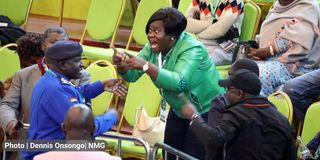Here’s how to manage anxiety as the tallying of votes drags on

Homa Bay Governor elect Gladys Wanga raises concerns on the ongoing verification exercise at the Bomas of Kenya on Friday, August 12, 2022.
For the last four days, Elizabeth Muga has been spending most of her time staring at her TV screen hoping that the winner of the Tuesday’s presidential election will be announced.
With the Independent Electoral and Boundaries Commission (IEBC) having opened its portal to the public, Ms Muga was among those who downloaded the Forms 34A and unsuccessfully tried to tally the results.
“I am restless, anxious and in panic mode. I have tried switching off my phone and TV but I can’t I do it for long because I think the other side is winning,” she says.
Ms Muga’s predicament captures that of millions of Kenyans who are anxiously waiting for the presidential poll results.
Social media sites Facebook, Twitter and WhatsApp have equally not helped thanks to the misinformation and disinformation being peddled there, triggering anxiety disorders among people.
A study conducted in 2019 and published in PLOS One, a peer-reviewed scientific journal, showed that engaging in politics can have negative consequences on your health and friendships.
Out of the 800 people that were interviewed, about 18 per cent reported that politics had caused them to lose sleep and more than 29 per cent said they had lost their temper because of it.
More than 11 per cent said politics had adversely affected their physical health and more than 26 per cent said they had become depressed when a preferred candidate lost.
When one is anxious or stressed, the heartbeat rate and blood pressure rise and stress hormones start to flood. It, thus, becomes harder to rest, sleep, focus or breathe.
Symptoms that show one is anxious and stressed include restlessness, difficulty in concentrating, insomnia, irritated emotions, shortness of breath and struggling to function during the day.
Psychologists have long recognised that anxiety is a normal and healthy function that alerts us to threats and helps us take measures to protect ourselves.
Ms Daisy Khaindi, a counselling psychologist and lead counsellor at Convo Care Kenya, says the anxiety that has gripped many over polls is worse in people with mental disorder.
“These are people that already have triggers and whenever they are anxious, their adrenaline rush is quickly released and may affect them more,” she says
For those with symptoms that include insomnia, lack of appetite, triggers and restlessness, the best thing to do, she says, is to avoid the cause of the trigger and engage in activities that cool the mind.
“If it’s social media causing anxiety, restrain from looking at it. Also, learn how to more actively set boundaries in conversations. It’s okay to tell people that you’d rather not talk about the election and change the subject,” she advises.
She adds: “If possible refrain from having a conversation with colleagues with opposing political viewpoints to avoid being emotional.”
Ms Khaindi notes that it is a challenging time for Kenyans who were previously displaced during the last election since the anxiety tends to trigger and return the panic attacks that they had.
“I have always told my patients to awaken their inner self. The inner self never dies, reassure it that all is well. When you experience the symptoms spend more time with your loved ones, talk to your friends, dance and have peace with yourself. This will go a long way in managing the anxiety.”
She advises that when the symptoms persist, it is advisable that one seeks professional support before it is late.
Dr Ellen Slawsby, an assistant clinical professor of psychology at Harvard Medical School, has also studied the impact of political stress on patients that she attends to.
She encourages them to engage in a daily 20-minute “relaxation response” which could be meditation, deep breathing or exercise.
“Meditation can help with stress and anxiety by re-framing our relationship with our thoughts,” she says
But how does one manage themselves while waiting for results? “They should avoid and stop thinking about the worst-case scenario, which is their candidate losing. It is even better to take a walk or listen to music but avoid social media and phones by all means,” she says.
According to her, it is critical to remain informed but one should manage their anxiety by establishing the necessary limitations, including deleting negative social media posts. “Try even switching your phone off and keeping it far from you”
The same goes for the television. Watching the screen with the results trickling might just stress you even more. Keep off if you can, she adds.





